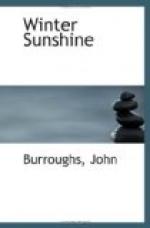I remember the pleasure I had in the path that connects Stratford-on-Avon with Shottery, Shakespeare’s path when he went courting Anne Hathaway. By the king’s highway the distance is some farther, so there is a well-worn path along the hedgerows and through the meadows and turnip patches. The traveler in it has the privilege of crossing the railroad track, an unusual privilege in England, and one denied to the lord in his carriage, who must either go over or under it. (It is a privilege, is it not, to be allowed the forbidden, even if it be the privilege of being run over by the engine?) In strolling over the South Downs, too, I was delighted to find that where the hill was steepest some benefactor of the order of walkers had made notches in the sward, so that the foot could bite the better and firmer; the path became a kind of stairway, which I have no doubt the plowman respected.
When you see an English country church withdrawn, secluded, out of the reach of wheels, standing amid grassy graves and surrounded by noble trees, approached by paths and shaded lanes, you appreciate more than ever this beautiful habit of the people. Only a race that knows how to use its feet, and holds footpaths sacred, could put such a charm of privacy and humility into such a structure. I think I should be tempted to go to church myself if I saw all my neighbors starting off across the fields or along paths that led to such charmed spots, and were sure I should not be jostled or run over by the rival chariots of the worshipers at the temple doors. I think that is what ails our religion; humility and devoutness of heart leave one when he lays by his walking shoes and walking clothes, and sets out for church drawn by something.
Indeed, I think it would be tantamount to an astonishing revival of religion if the people would all walk to church on Sunday and walk home again. Think how the stones would preach to them by the wayside; how their benumbed minds would warm up beneath the friction of the gravel; how their vain and foolish thoughts, their desponding thoughts, their besetting demons of one kind and another, would drop behind them, unable to keep up or to endure the fresh air! They would walk away from their ennui, their worldly cares, their uncharitableness, their pride of dress; for these devils always want to ride, while the simple virtues are never so happy as when on foot. Let us walk by all means; but if we will ride, get an ass.
Then the English claim that they are a more hearty and robust people than we are. It is certain they are a plainer people, have plainer tastes, dress plainer, build plainer, speak plainer, keep closer to facts, wear broader shoes and coarser clothes, and place a lower estimate on themselves,—all of which traits favor pedestrian habits. The English grandee is not confined to his carriage; but if the American aristocrat leaves his, he is ruined. Oh the weariness, the emptiness, the plotting, the




